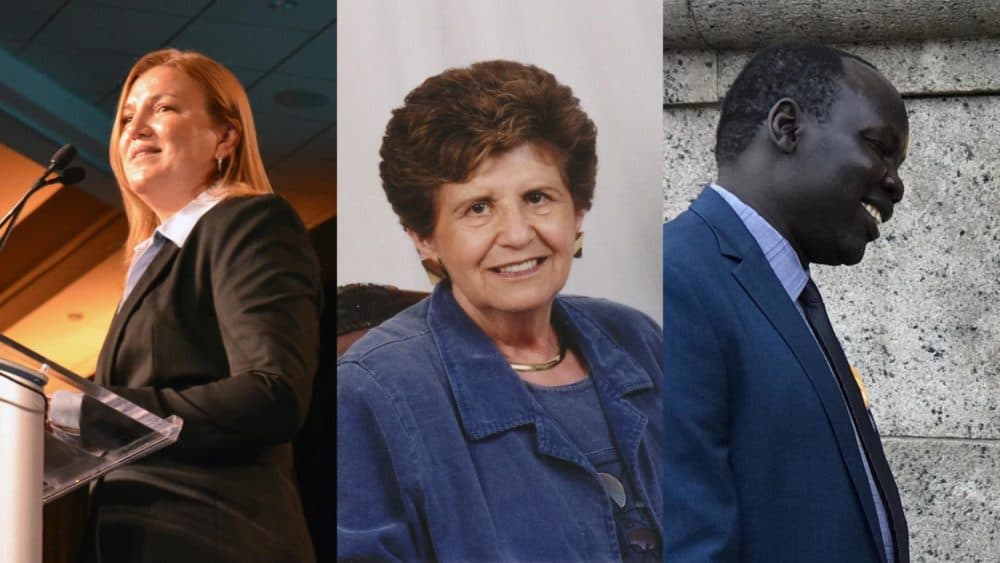Our lives are made up of moments defined by chance, circumstance, and the choices we make. In these times of heightened antisemitism, racism and division, the choices we make individually and as a society have the power to either raise up or diminish the human spirit.
Facing History hosted a reflective and inspirational evening featuring Schindler's List survivor Rena Finder and reflections by author James Carroll. An incredible panel of genocide survivors lent their voices as we explored the moments in our shared history when the human spirit has been tested, in an effort to reflect, understand and take action today.
This program was part of Facing History’s Echos of the Holocaust Series.
Panelists
Rena Finder - Rena Ferber Finder was born in Krakow, Poland. In 1939, Nazi troops forced Jews like Rena and her family to move into the ghetto. Eventually, the SS evacuated the ghetto, ordering all of its residents to move to the Plaszow work camp. For Rena, hope came in the form of Emalia, a factory owned by the German industrialist Oskar Schindler. Unlike other businessmen, Schindler did not take advantage of slave labor in the SS camps or mistreat his workers. In 1944, the SS ordered Schindler to shut down Emalia and ordered that the women working there be sent to the Auschwitz-Birkenau concentration camp. Instead, Schindler negotiated with the SS and wrote out “Schindler’s List”, with the names of former workers who should be kept off the trains headed to Auschwitz. Rena Ferber’s name was on the list, along with her mother and grandfather.
Jasmina Cesic - Jasmina Cesic grew up in Visegrad, Bosnia, a beautiful town on the Drina River where Muslims and Serbs lived together peacefully. At the beginning of the 1990s, her life was that of a typical teenage girl concerned with school, boys, family, and friends. She married her high school sweetheart, Suljo, after graduation. But Yugoslavia was beginning to unravel, and ethnic hatred brought violence and fear to Jasmina’s once-peaceful town. Jasmina lost many members of her family to the Serbian campaign of ethnic cleansing against Muslims. Her husband was killed in the same Sarajevo mortar attack that took Jasmina’s right arm. Jasmina came to the United States in 1993, as one of the first Bosnian refugees to seek medical treatment here during the conflict. She learned English, went to school, remarried, and started a family. Her story is one of fear, horror and personal tragedy, and also of kindness, resilience and hope.
Bol Riiny - Early one October morning in 1990 Sudanese government tanks and soldiers swooped into the small, heavily Christian village of Thiou, releasing a wave of bullets and setting the village’s small houses ablaze. Bol Riiny, then just 8-years-old, leaped out of bed, bewildered and half-asleep, and ran. In the chaos, he lost his family, forcing him and a group of villagers to embark on a long journey that would alter his life forever. He didn’t know it at the time, but Riiny had just become one of the “Lost Boys of Sudan,” the name given to more than 20,000 Sudanese boys who were displaced or orphaned during the second Sudanese civil war. Bol trekked across South Sudan into Ethiopia and eventually to Kenya after Ethiopia erupted into its own civil war. He was eventually admitted into the United States, and moved in with a family in Winchester through the Lutheran Social Service program. He is among roughly 500 refugees from South Sudan that have settled in the Boston area. Bol works in Boston and now and lives with his family in Woburn, but his thoughts are still very much in Thiou. Since arriving in the United States in 2000 Bol has returned to Thiou to reunite with his immediate family, and started a fundraising mission to build a school for his village.

